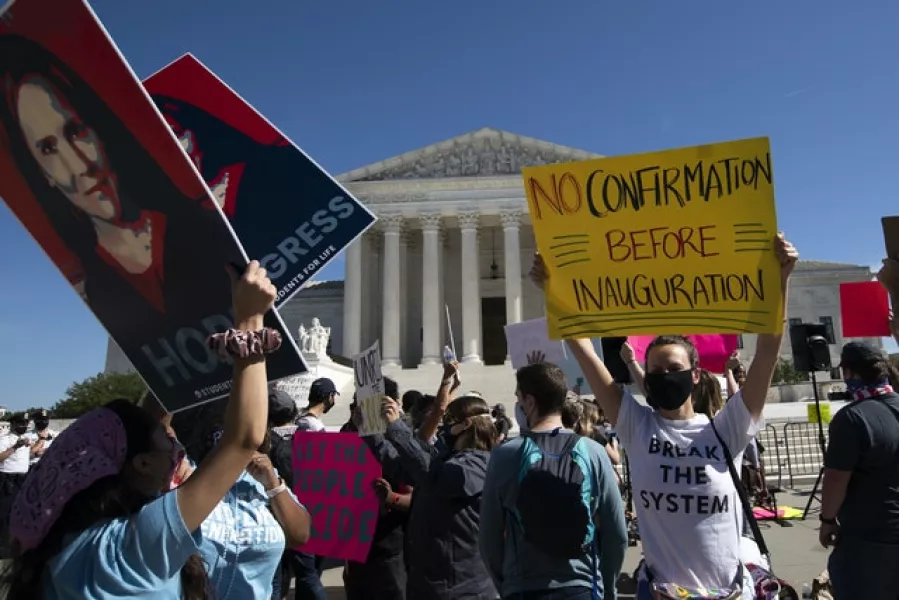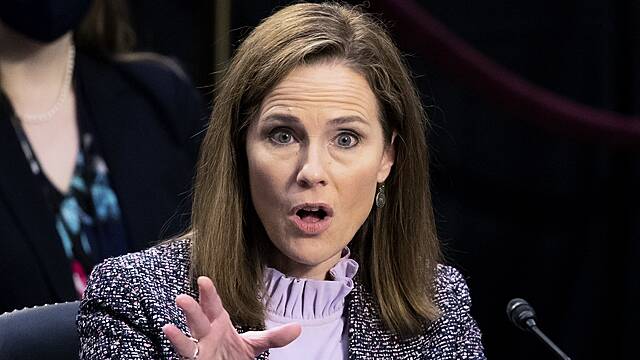The session is without Ms Barrett after two long days of public evidence in which she stressed that she would be her own judge and sought to create distance between herself and past positions critical of abortion, the Affordable Care Act and other issues.
Her confirmation to take the seat of the late Justice Ruth Bader Ginsburg seems inevitable, as even some Senate Democrats acknowledged.
Senator Lindsey Graham pushed past Democratic objections to set the panel’s October 22 vote on recommending her confirmation even before final witnesses give evidence before and against her nomination.
The committee set the vote for next week.
As I said at the hearing today, the tracks left by Judge Barrett lead to one place: she will have the polar opposite judicial philosophy of Justice Ginsburg.
Advertisement— Amy Klobuchar (@amyklobuchar) October 14, 2020
“This is a sham,” said Senator Amy Klobuchar, a Democrat.
In the minority, Democrats acknowledge there is little they can do stop them from locking a conservative majority on the court for years to come.
The shift would cement a 6-3 conservative majority on the court and would be the most pronounced ideological change in 30 years, from the liberal standard bearer to the conservative appeals court judge.
Facing almost 20 hours of questions from senators, the 48-year-old judge was careful not to take on the president who nominated her and sought to separate herself from writings on controversial subjects when she was an academic.
She skipped past Democrats’ pressing questions about ensuring the date of next month’s election or preventing voter intimidation, both set in federal law, and the peaceful transfer of presidential power.
She also refused to express her view on whether the president can pardon himself.
“It’s not one that I can offer a view,” she said in response to a question on Wednesday from Democratic Senator Patrick Leahy of Vermont.
Democrats raised those questions because President Donald Trump has done so himself.
When it came to major issues that are likely to come before the court, including abortion and health care, Ms Barrett repeatedly promised to keep an open mind and said neither Mr Trump nor anyone else in the White House had tried to influence her views.
“No one has elicited from me any commitment in a case,” she said.

Nominees typically resist offering any more information than they have to, especially when the president’s party controls the Senate, as it does now.
But Ms Barrett would not engage on topics that seemed easy to swat away, including that only Congress can change the date that the election takes place.
She said she is not on a “mission to destroy the Affordable Care Act,” though she has been critical of the two Supreme Court decisions that preserved key parts of the Obama-era health care law.
She could be on the court when it hears the latest Republican-led challenge on November 10.
Ms Barrett is the most open opponent of abortion nominated to the Supreme Court in decades, and Democrats fear that her ascension could be a tipping point that threatens abortion rights.
There was no hiding her views in at least three letters and ads she signed over 15 years and her membership in Notre Dame’s Faculty for Life.
So Republican senators embraced her stance, proudly stating that she was, in Mr Graham’s words, an “unashamedly pro-life” conservative who is making history as a role model for other women.
Democrats spent the day trying to turn #AmyConeyBarrett into their “handmaid” - make these promises, use these pronouns, submit to these religious tests. It was an epic disaster. For them.
— Josh Hawley (@HawleyMO) October 14, 2020
Senator Josh Hawley, also a Republican, said there “is nothing wrong with confirming a devout pro-life Christian”.
Ms Barrett refused to say whether the 1973 landmark Roe v. Wade ruling on abortion rights was correctly decided, though she signed an open letter seven years ago that called the decision “infamous”.
Democrats pressed repeatedly on the judge’s approach to health care, abortion, racial equity and voting rights, but conceded they were unlikely to stop her quick confirmation.
“When you are on the court,” Senator Sheldon Whitehouse, a Democrat, began one question in which he asked her to keep an open mind on the high court bench.
Ms Barrett readily agreed to do so.
In an exchange with Senator Dianne Feinstein, a Democrat, Ms Barrett resisted the invitation to explicitly endorse or reject the late Justice Antonin Scalia’s comments about perpetuating “racial entitlement” in a key voting rights case.

“When I said that Justice Scalia’s philosophy is mine, too, I certainly didn’t mean to say that every sentence that came out of Justice Scalia’s mouth or every sentence that he wrote is one that I would agree with,” Ms Barrett said.
She called the Voting Rights Act a “triumph in the civil rights movement”, without discussing the specifics of the earlier challenge to it.
The court will hear another challenge to the law early next year.







